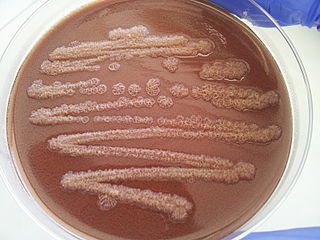Related Research Articles

Pseudomonas stutzeri is a Gram-negative soil bacterium that is motile, has a single polar flagellum, and is classified as bacillus, or rod-shaped. While this bacterium was first isolated from human spinal fluid, it has since been found in many different environments due to its various characteristics and metabolic capabilities. P. stutzeri is an opportunistic pathogen in clinical settings, although infections are rare. Based on 16S rRNA analysis, this bacterium has been placed in the P. stutzeri group, to which it lends its name.
Marinobacter is a genus of Proteobacteria found in sea water. They are also found in a variety of salt lakes. A number of strains and species can degrade hydrocarbons. The species involved in hydrocarbon degradation include M. alkaliphilus, M. arcticus, M. hydrocarbonoclasticus, M. maritimus & M. squalenivorans.
Gallaecimonas is a recently described genus of bacteria. The first described species of this genus was Gallaecimonas pentaromativorans gen. nov., sp. nov. isolated by Rodríguez Blanco et al. in 2010 from intertidal sediments of the ria of Corcubión. It is a Gram-negative, rod-shaped, halotolerant bacterium in the class Gammaproteobacteria. It can degrade high molecular mass polycyclic aromatic hydrocarbons of 4 and 5 rings. The 16S rRNA gene sequences of the type strain CEE_131(T) proved to be distantly related to those of Rheinheimera and Serratia. Its G+C content was 41.7 mol%.
Alcanivorax pacificus is a pyrene-degrading marine gammaprotobacterium. It is of the genus Alcanivorax, a group of marine bacteria known for degrading hydrocarbons. When originally proposed, the genus Alcanivorax comprised six distinguishable species. However, A. pacificus, a seventh strain, was isolated from deep sea sediments in the West Pacific Ocean by Shanghai Majorbio Bio-pharm Technology Co., Ltd. in 2011. A. pacificus’s ability to degrade hydrocarbons can be employed for cleaning up oil-contaminated oceans through bioremediation. The genomic differences present in this strain of Alcanivorax that distinguish it from the original consortium are important to understand to better utilize this bacteria for bioremediation.
Novosphingobium pentaromativorans is a species of high-molecular-mass polycyclic aromatic hydrocarbon-degrading bacterium. It is Gram-negative, yellow-pigmented and halophilic. With type strain US6-1T. Its genome has been sequenced.
Sphingomonas polyaromaticivorans is a Gram-negative, aerobic, short-rod-shaped and non-motile bacteria from the genus of Sphingomonas which has been isolated from water from the Botan Oil Port in Xiamen in China. Sphingomonas polyaromaticivorans has the ability to degrade hydrocarbon compounds.
Marinobacter aromaticivorans is a Gram-negative, rod-shaped and slightly halotolerant bacterium from the genus of Marinobacter which has been isolated from sediments from the South China Sea. Marinobacter aromaticivorans has the ability to degrade polycyclic aromatic hydrocarbons.
Gordonia alkanivorans is a bacterium from the genus of Gordonia which has been isolated from soil which was contaminated with tar and phenol in Rositz in Germany. Gordonia alkanivorans has the ability to metabolize hexadecane. The strain RIPI90A of Gordonia alkanivorans can desulfurize dibenzothiophene.
Gordonia paraffinivorans is a bacterium from the genus of Gordonia which has been isolated from the Daqing Oil Field in China. Gordonia paraffinivorans has the ability to degrade hydrocarbon.
Xenophilus azovorans is a bacterium from the genus Xenophilus which has been isolated from soil in Switzerland.
Novosphingobium indicum is a bacterium from the genus of Novosphingobium which has been isolated from deep-sea water from the Indian Ocean. Novosphingobium indicum hasd the ability to degrade polycyclic aromatic hydrocarbon.
Olivibacter is a genus from the family of Sphingobacteriaceae.
Olivibacter ginsengisoli is a Gram-negative, aerobic, heterotrophic, rod-shaped, non-spore-forming and non-motile bacterium from the genus of Olivibacter which has been isolated from Korea.
Olivibacter jilunii is a Gram-negative, aerobic, non-spore-forming and non-motile bacterium from the genus of Olivibacter which has been isolated from DDT-contaminated soil in China.
Olivibacter sitiensis is a gram-negative, aerobic, non-spore-forming, rod-shaped and non-motile bacterium from the genus of Olivibacter that has been isolated from alkaline olive-oil mill wastes on Sitia on Crete. Olivibacter sitiensis has the ability to degrade diphenol.
Olivibacter soli is a Gram-negative, aerobic, non-spore-forming, rod-shaped, heterotrophic and non-motil bacterium from the genus of Olivibacter which has been isolated from Korea.
Olivibacter terrae is a Gram-negative, aerobic, heterotrophic, rod-shaped, non-spore-forming and non-motile bacterium from the genus of Olivibacter which has been isolated from Korea.
Zoogloea oleivorans is a gram-negative bacterium from the genus of Zoogloea. Its type strain was isolated from a filter for petroleum hydrocarbons from a site in Hungary.
Stenotrophomonas acidaminiphila is a strictly aerobic, Gram-negative, mesophilic, non-spore-forming and motile bacterium from the genus of Stenotrophomonas which has been isolated from industrial waste water in Mexico. Stenotrophomonas acidaminiphila can degrade polycyclic aromatic hydrocarbons.
Olivibacter composti is a Gram-negative and aerobic bacterium from the genus of Olivibacter which has been isolated from compost from a greenhouse in Taiwan.
References
- 1 2 Parte, A.C. "Olivibacter". LPSN .
- ↑ "NCAIMB 02393 Strain Passport - StrainInfo". www.straininfo.net.
- 1 2 "Olivibacter oleidegradans". www.uniprot.org.
- 1 2 Szabo, I.; Szoboszlay, S.; Kriszt, B.; Hahn, J.; Harkai, P.; Baka, E.; Tancsics, A.; Kaszab, E.; Privler, Z.; Kukolya, J. (21 January 2011). "Olivibacter oleidegradans sp. nov., a hydrocarbon-degrading bacterium isolated from a biofilter clean-up facility on a hydrocarbon-contaminated site". International Journal of Systematic and Evolutionary Microbiology. 61 (12): 2861–2865. doi: 10.1099/ijs.0.026641-0 . PMID 21257685.